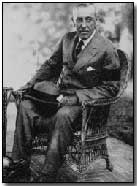Primary Documents - Woodrow Wilson's Opening Address at the Paris Peace Conference, 18 January 1919
 With Germany's decision to
seek an
armistice - or face domestic as well as military collapse -
arrangements were set in place to convene a peace conference in Paris; the city was unanimously selected by the Allied powers.
With Germany's decision to
seek an
armistice - or face domestic as well as military collapse -
arrangements were set in place to convene a peace conference in Paris; the city was unanimously selected by the Allied powers.
The conference began somewhat belatedly in mid-January with opening addresses from many of the key Allies.
Reproduced below is the opening address by U.S. President Woodrow Wilson.
Click here to read the welcoming address given to delegates by French President Raymond Poincare; click here to read British Prime Minister David Lloyd George's address; click here to read Italian Prime Minister Sidney Sonnino's address; click here to read French Prime Minister Georges Clemenceau's address. Click here to read an account of the run up to the opening session by the official British observer Sisley Huddleston.
Click here to read the German delegation's protest against the final Allied peace terms. Click here to read the Allied response. Click here to read a Dutch newspaper editorial condemning the Allied terms. Click here to read a journalist's account of the signing ceremony.
Click here to read the text of the eventual peace treaty.
Woodrow Wilson's Opening Address Nominating Georges Clemenceau as President of the Conference, 18 January 1919
I have the great honour to propose as definitive president of this conference the French Premier, M. Clemenceau.
I do so in conformity with usage. I should do it even if it were only a question of paying homage to the French Republic, but I do it also because I desire, and you certainly desire with me, to pay homage to the man himself.
France, as it is, would alone deserve this honour, but we are today in her capital, and it is here that this great Conference has met. France, by her sufferings and sacrifices during the war, deserves a special tribute. Moreover, Paris is her ancient and splendid capital, where more than once these great assemblages, on which the fate of the world has depended, have met.
I am happy to think that the meeting which is beginning crowns the series of these meetings. This Conference may be considered in some respects as the final crowning of the diplomatic history of the world tip to this day, for never have so many nations been represented at the same time to solve problems which in so high a degree interest the whole world.
Moreover, this meeting signifies for us the end of this terrible war, which threatened to destroy civilization and the world itself. It is a delightful sensation for us to feel that we are meeting at a moment when this terrible menace has ceased to exist.
But it is not only to France, it is to the man who is her great servant that we wish to pay homage and to do honour. We have learned, since we have had relations with him, and since he has been at the head of the French Government, to admire the power of his direction and the force and good sense of his actions.
But, more than this, those who know him, those who have worked in close connection with him, have acquired for him a real affection. Those who, like ourselves, have seen him work in these recent times know how much he is united with us, and with what ardour he is working for that which we ourselves desire.
For we all desire the same thing. We desire before all to lift from the shoulders of humanity the frightful weight which is pressing on them, so that humanity, released from this weight, may at last return joyfully to work.
Thus, gentlemen, it is not only to the Premier of the French Republic, it is to M. Clemenceau that I propose you should give the presidency of this assemblage.
Source: Source Records of the Great War, Vol. VII, ed. Charles F. Horne, National Alumni 1923
A 'Tracer' was a phosphorescent machine-gun bullet which glowed in flight, indicating course as an aid to artillery.
- Did you know?
